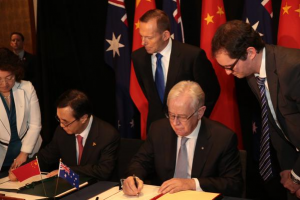After 10 years in the making, Australia’s Trade Minister, Andrew Robb, and China’s Commerce Minister, Gao Hucheng signed the landmark bilateral Free Trade Agreement on Wednesday.

Inked in Canberra, the FTA will set an example for economic and trade development in the Asia Pacific and serve as a platform to further the cooperation between the two countries.
The signing of ChAFTA gives Australia and China unprecedented access to each other’s markets by removing barriers to exports.
ChAFTA is set to increase market access for Australian beef and wine exporters while boosting Chinese carmakers and electronics producers who wish to sell their goods to Australians.
On day one of the ChAFTA, more than 85 per cent of Australian goods exports will be tariff free, rising to 95 per cent on full implementation.
Under the terms of the Agreement, tariffs will be eliminated on a wide range of Australian manufactured goods, including pharmaceutical products and car engines.
Tariffs will also be removed on almost all Australian resources and energy products, including the 8 per cent tariff on aluminium oxide on the first day of the Agreement, benefitting Australia’s exports worth around $1.3 billion a year. The tariffs on coking coal will be removed on day one, with the tariff on thermal coal being phased out over two years.
“ChAFTA completes a historic trifecta of trade agreements with our top three export markets, accounting for more than 55 per cent of our total goods and services exports. Together, these agreements will enhance our vital trade and investment relationships in the region, assist the process of reform, and foster greater prosperity,” said Minister Robb.
“Our FTAs with Korea and Japan are only months old and we are already seeing increased exports compared to a year ago – like a 26 per cent increase in frozen beef prime cuts to Korea and a massive 84 per cent increase in the same product to Japan. Macadamia exports to Korea have more than doubled, and Japan is importing 82 per cent more of our rolled or flaked oats. Increases have also been seen in wine, lamb, horticulture and many other products, and we look forward to further positive outcomes once ChAFTA comes into force.”
The Agreement includes an investor-state dispute settlement clause which will allow Chinese and Australian companies to appeal to an extraterritorial tribunal if they believe they have been discriminated against.
The Agreement also allows Australian firms to bring in an unlimited number of temporary workers from China.
ChAFTA is set to deliver a $20 billion boost to trade by 2035.



















